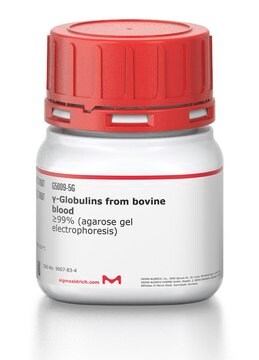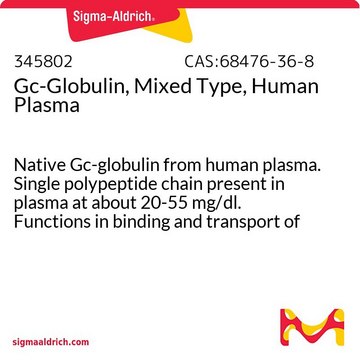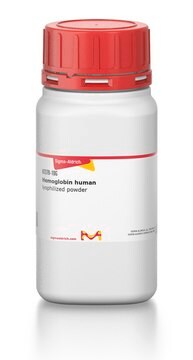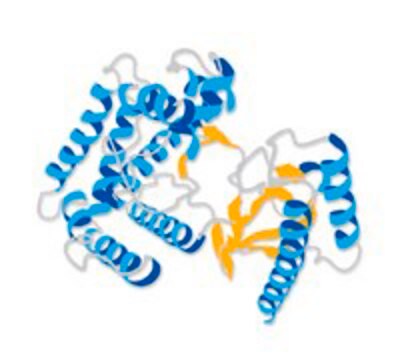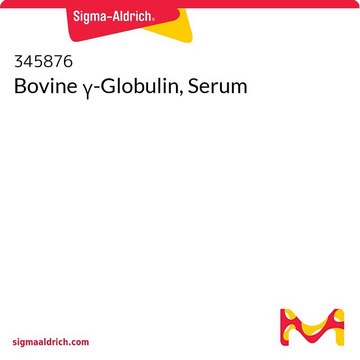G4386
γ-Globulins from human blood
≥99% (electrophoresis)
Sinónimos:
Human γ-Globulin
Iniciar sesiónpara Ver la Fijación de precios por contrato y de la organización
About This Item
Productos recomendados
biological source
human blood
Quality Level
assay
≥99% (electrophoresis)
form
powder
technique(s)
protein quantification: suitable
impurities
HIV, HCV and HBsAg, source material tested negative
≤4% NaCl
solubility
0.9% NaCl: soluble 50 mg/mL
UniProt accession no.
storage temp.
2-8°C
Gene Information
human ... IGLL1(3543)
¿Está buscando productos similares? Visita Guía de comparación de productos
General description
γ-Globulins are immunoglobulins and occur in five classes, namely: IgG, IgM, IgA, IgD, and IgE. These are glycoproteins that are antibodies produced by plasma cells. The immunoglobulins are heterogeneous molecules made up of four polypeptide chains (two light chains and two heavy chains) linked together by disulfide bonds. The antigen-binding site is present at the nitrogen terminal. 20% of the protein in plasma are immunoglobulins.
Application
γ-Globulins from human blood have been used for the blocking step in cytometric bead array It has also been used as a standard for γ-globulin measurement in cerebrospinal fluid (CSF).
γ-globulins were used to study a micro-method for measuring total protein in cerebrospinal fluid by using benzethonium chloride in microtiter plate wells. It was used in the measurement of protein in tannin-protein precipitates using ninhydrin. It was also used to study the blood distribution of levocetirizine, a new non-sedating histamine H1-receptor antagonist, in humans.
Biochem/physiol Actions
Immunoglobulins are key regulators of the immune system and are produced in response to antigens. They protect our bodies against bacteria, viruses, and fungi. Immunoglobulins are involved in the activation of the complement system, opsonization of microbes for phagocytosis, neutralization of toxins and viruses, and inhibition of the attachment of microbes to mucosal surfaces. Immunodeficiency can lead to recurrent infectious diseases.
Preparation Note
Prepared from Cohn Fraction II, III
Disclaimer
RESEARCH USE ONLY. This product is regulated in France when intended to be used for scientific purposes, including for import and export activities (Article L 1211-1 paragraph 2 of the Public Health Code). The purchaser (i.e. enduser) is required to obtain an import authorization from the France Ministry of Research referred in the Article L1245-5-1 II. of Public Health Code. By ordering this product, you are confirming that you have obtained the proper import authorization.
Storage Class
11 - Combustible Solids
wgk_germany
WGK 3
flash_point_f
Not applicable
flash_point_c
Not applicable
Elija entre una de las versiones más recientes:
¿Ya tiene este producto?
Encuentre la documentación para los productos que ha comprado recientemente en la Biblioteca de documentos.
Blood
Sturkie's Avian Physiology, 167-191 (2015)
F Kilár et al.
European journal of biochemistry, 147(1), 17-25 (1985-02-15)
The structure of six human myeloma proteins: IgG1(Bal), IgG2(Klu), IgG3(Bak), IgG3(Het), IgG4(Kov) and IgG4(Pol), was studied in solution using small-angle X-ray scattering and hydrodynamic methods. For IgG1(Bal) and IgG3(Het) the experimental data, including radius of gyration (Rg degree), radii of
Immunoglobulin E (Ige): Novel Treatment for Lowering the Concentration of Ige (2021)
Turbidimetric measurement of $\gamma$-globulin in cerebrospinal fluid with use of sulfosalicylic acid and Triton X-100
Ihara H, et al.
Journal of Analytical Bio-Science Vol, 32(5) (2009)
David Nečas et al.
Materials (Basel, Switzerland), 11(5) (2018-05-12)
The paper introduces an experimental investigation of frictional behaviour of materials used for joint replacements. The measurements were performed using a ball-on-disc tribometer, while four material combinations were tested; metal-on-metal, ceramic-on-ceramic, metal-on-polyethylene, and ceramic-on-polyethylene, respectively. The contact was lubricated by
Nuestro equipo de científicos tiene experiencia en todas las áreas de investigación: Ciencias de la vida, Ciencia de los materiales, Síntesis química, Cromatografía, Analítica y muchas otras.
Póngase en contacto con el Servicio técnico